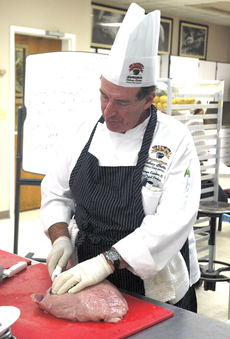For 10 years, faculty chefs of the John Folse Culinary Institute at Nicholls fused Southern American cuisine with international flavor for its culinary arts program.Sponsored by the Southern United States Trade Association, the U.S. Department of Agriculture and the Sysco Corporation, the Institute is involved in a grant-funded program titled “Go South! Fresh from the Southern U.S.”
American chefs expose colleagues across the globe to culture and techniques found in Southern cuisine. The program also promotes the use and versatility of local produce and ingredients. Louisiana, along with 14 states and Puerto Rico, is involved in the program.
Chef George Kaslow, assistant professor at the Institute, returned to Nicholls this week after teaching Southern culinary techniques to chefs in Canada.
“The Culinary Institute gets very good exposure being involved in international academics and programs of Southern cuisine,” Kaslow said. “I am proud that the John Folse Culinary Institute at Nicholls represents the state of Louisiana, its culture and cuisine to the world.”
Kaslow taught two seminars with his wife, assistant chef Sharon Kaslow, at the Sysco Culinary Center in Toronto as part of the program between Faye Clack Communications of Canada and the Institute-one on Cajun and Creole cuisine, the other on Southern barbecue and cuisine of Florida and Puerto Rico. Each seminar was conducted over a two-day period.
The Canadian chefs were divided into groups of two. In the Cajun and Creole seminar, chefs practiced cooking dishes such as jambalaya, gumbo, collard greens, bread pudding and pecan pie. As Kaslow explained ingredients, recipes, proper cooking techniques and a dish’s flavor profile, the Canadian chefs learned the history and culture behind the dish. They also learned how to use Louisiana-based products such as shrimp, crab, oyster, okra and andouille. Afterward, the Canadian chefs tasted their final creations.
“The entire time we walked around with spoons in our pockets [to taste the food],” Kaslow said.
Kaslow encountered a cooking habit found in most Canadian chefs. Their cooking style, mostly influenced by the English, lacked flavor.
“On the first day, I had to teach the chefs to have a heavier hand when it came to adding seasonings to Cajun and Creole food,” Kaslow said. “I also had to teach the use of a roux and the use of trinity vegetables-onions, celery and bell peppers-which is the basis of most Louisiana dishes.”
The Canadian chefs learned six recipes for gumbo-chicken and oyster; duck and andouille; egg and dried shrimp; shrimp, okra and andouille; seven steak with okra and Louisiana seafood. Kaslow said, the lessons on gumbo were a big hit with the Canadian chefs. “The chefs were excited when we gave awards for the best gumbo cooked,” he said.
During the Southern barbecue and Florida/Puerto Rico cuisine seminar, Canadian chefs learned variations of barbecue found in Southern states and Latin American-influenced cuisine.
A major component of “Go South!” is the reciprocal exchange between American chefs and international chefs. During the time the Institute has been involved, international chefs have traveled to Nicholls each summer to learn from faculty chefs. As a result, the Institute’s chefs gained ideas from the visiting chefs. As the chefs learned from each other, they discovered ways to fuse the cultures together to create new culinary masterpieces.
Kaslow has also visited India and Taiwan over the last year to study and teach. The information he gathered is brought into practice within the Institute. Nicholls students aspiring to become chefs are exposed to his knowledge and learn a country’s cuisine firsthand.
“I always come back from the experiences as a more well-rounded chef, learning and appreciating someone else’s culture through food,” Kaslow said.
Kaslow will travel to Shanghai, China for his next culinary learning experience in 2010. In turn, 12 chefs from Shanghai, Canton, Macao and Hong Kong provinces in China will visit Nicholls for two weeks in May to learn from the Institute’s chefs.
Even though language can be a barrier, Kaslow said food alleviates that problem.
“Food is a universal language,” Kaslow said. “We can communicate with and learn from each other through the common experience of food.








